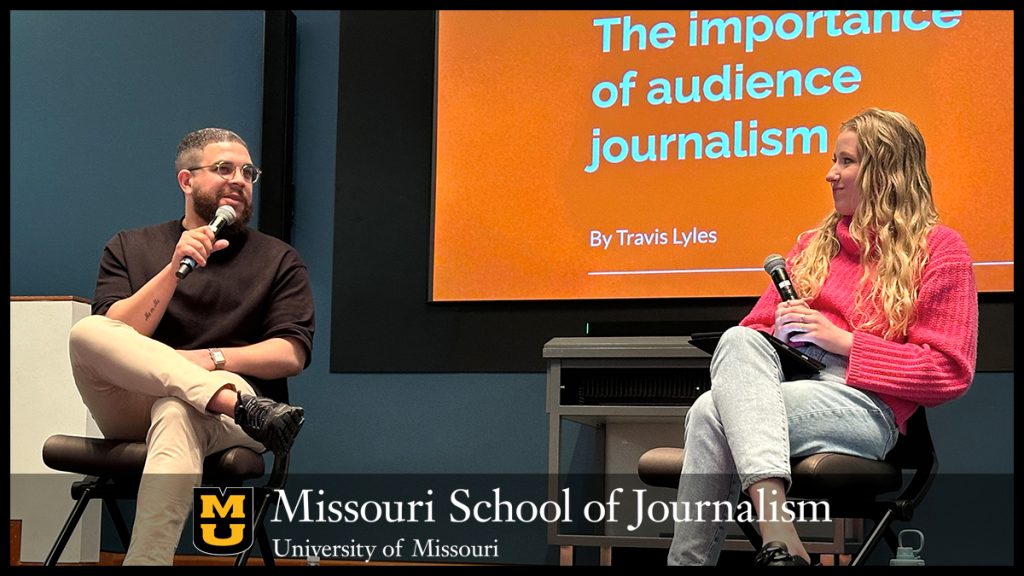Washington Post’s Travis Lyles inaugurates Audience Speaker Series at Missouri School of Journalism

Senior Emily Hood, right, moderates a discussion with Travis Lyles, deputy director of social at The Washington Post, April 10, 2024, in RJI Smith Forum. Lyles’ visit kicked off the new Audience Speaker series. Photo: Nate Brown
COLUMBIA, Mo. (April 12, 2024) — Travis Lyles, the deputy director of social for the Washington Post, visited the Missouri School of Journalism to share firsthand insights from his work at the renowned paper.
Organized by assistant professors Kara Edgerson and Kat Lucchesi, the event served as the first installment of the School’s new Audience Speaker Series and capped off a series of visits Lyles made to social and audience strategy, community journalism and cross-cultural journalism classes on Monday and Tuesday.
“The main purpose was to educate not just students, but faculty, staff and whoever is interested in what it means to be audience focused in the journalism field,” Lucchesi said.
Lyles spoke — both in a prepared presentation and in a Q&A moderated by senior Emily Hood — about what that audience focus means for newsrooms as the industry continues to adjust to changing consumer trends and economic conditions.
“We as an industry are so good at creating journalism, but we’re not as good at getting that content to people how, when and where they want it,” Lyles said. “I’m often the person who says, why did we write this? Did we think about who is on the other end of this story? We think about the reader first, and that’s so important.”
We as an industry are so good at creating journalism, but we’re not as good at getting that content to people how, when and where they want it. I’m often the person who says, why did we write this? Did we think about who is on the other end of this story? We think about the reader first, and that’s so important.
Travis Lyles
Lyles himself has played no small role in leading the industry toward a greater focus on using social media to reach audiences. In 2021, he became the Washington Post’s first Instagram editor, a title and position he created. Far from a tentative foray into social media, the job quickly blossomed into his current role overseeing an award-winning team that curates content for different platforms and — in times of breaking news like the events at the nation’s Capitol Building on Jan. 6, 2021, or the recent bridge collapse in Baltimore — keeps the public apprised of quickly evolving situations as they unfold.
“After [Jan. 6], we got over 50 emails from people saying they were in tune with what was happening at the capitol specifically because of our social media programming,” Lyles said. “So many of us got into this field to help people. And when you can do that — when you hear from them and they say thank you so much for doing this — it’s the best feeling in the world.”
He also emphasized to students that the skills of audience editors are translatable to a wide variety of jobs and fields, a notion the School of Journalism has embraced through its highly collaborative Missouri News Network of professional news organizations and a curriculum that requires cross-training across a variety of disciplines.
“Great audience editors can truly do a little bit of everything,” Lyles added. “They are copy editors, writers, they parse data, they are digital strategists. Even if you don’t want to be a reporter, you will have to do some writing in your career.”
For Lucchesi and Edgerson, that is a message that needs to be amplified as much as possible. Lyles’ visit is only the beginning of a series of speakers who will help raise awareness of the opportunities available to students and current professionals in the field of audience strategy.
“We had a really great turnout, but there are definitely people who still need to hear the message about how important audience is and that we need to meet the community where they are,” Lucchesi said. “Travis was amazing, and we want to build on that to bring even bigger awareness.”
The School plans to host the next speaker in the Audience Speaker Series this coming fall — look for more information in the coming months on journalism.missouri.edu
Updated: April 19, 2024